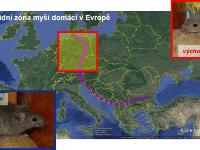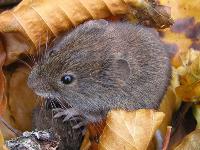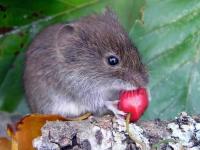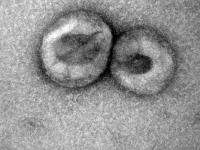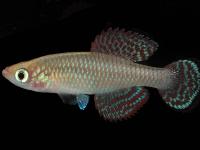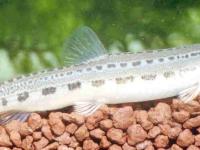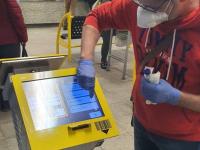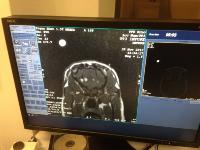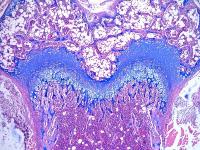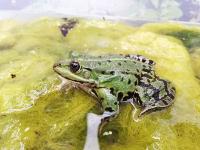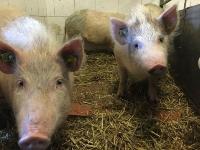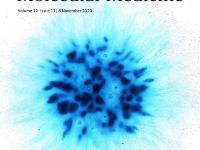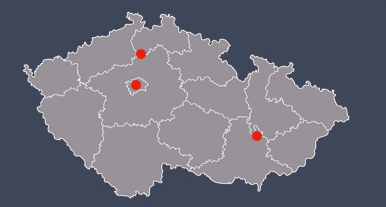
Press Release
Press Release
Search
Selected range: all newsThe close relationship between house mice and humans offers scientists a unique opportunity to study historical human migrations. A recent study by researchers from the Institute of Animal Physiology and Genetics of the CAS and the Institute of Vertebrate Biology of the CAS, published in the Zoological Journal of the Linnean Society, brings new insights. The extensive research included genetic samples from over 8,000 mice and is reshaping our understanding of the colonization of Europe by mice, providing a fresh perspective on human–animal interactions.
In the face of rapidly changing climate conditions, genetic mixing may be a key factor for species survival, enabling critical new adaptations. This is the conclusion of a research study conducted by a team of scientists from the Institute of Animal Physiology and Genetics of the Czech Academy of Sciences (IAPG CAS), in collaboration with colleagues from Oklahoma University and Cornell University in the United States. Their findings could help reshape current approaches to the conservation of endangered species.
Different characteristics between northern and southern bank vole populations in Britain, due to differences in haemoglobin types, could affect their ability to adapt to a changing climate. Research by scientists at the Institute of Animal Physiology and Genetics of the Czech Academy of Sciences has shown that northern populations of these small rodents will “borrow” a more favourable haemoglobin variant, critical for adaptation, from populations adapted to living in the warmer conditions of southern England to survive climate warming. The ability to take advantage of the diversity of traits already present in populations and adapt to climate change through them will be critical to the survival of many plant and animal species, including humans.
To monitor the onset and progression of diseases ort he effectiveness of treatment i tis essential to rely on indicators that reflect actual tissue damage and are easily accessible. Scientists from the Institute of Animal Physiology and Genetics CAS have succeeded in isolating small blood particles that are able to carry information about the neurodegenerative Huntington’s disease. Further research into the composition of these particles may help detect damage to otherwise inaccessible organs, including the brain.
Last year’s publication of an updated list of fish sex chromosomes describing the huge variation in different types of sex determination in fish has captured notable attention of the biology and biochemistry community. The work showed that the most well-known XY sex-determination systems, involved also in the determination of sex in humans, and their derivatives have a lower rate of degeneration than the ZW systems. They are therefore more malleable and leave more room for evolutionary processes. The database, created by the scientists from the Institute of Animal Physiology and Genetics CAS in collaboration with colleagues from the University of São Carlos in Brazil, provides fundamental information in the field of evolutionary biology that can be used in conservation genetics and aquaculture as well.
Changing the number or gene content of chromosomes in an organism is assumed to have grave, often fatal, consequences. However, scientists from the Institute of Animal Physiology and Genetics CAS have discovered that some animals do not mind such changes, but instead, they benefit from them by developing novel traits. Thanks to a unique study of asexual reproduction in loaches, experts have described the evolutionary processes of intracellular gene conflict leading to the emergence of new species that are successful in changing environments.
How to reduce the spread of the SARS-CoV-2 virus as much as possible? Experts from around the world are seeking the answer to this question with varying degrees of success. Amidst the peak of the pandemic, national lockdown and implementation of blanket measures, scientists from the Institute of Animal Physiology and Genetics CAS and Masaryk University in Brno, have proven that the SARS-CoV-2 virus did not occur in public areas where people obeyed the safety measures by wearing respirators and disinfecting their hands.
The Liběchov minipigs from the PIGMOD Center of the Institute of Animal Physiology and Genetics CAS were used in the pre-clinical testing of a new therapy for Huntington’s disease, a serious human disorder affecting the brain. The outcoming promising results have paved the way for the therapy to enter the clinical trial phase, bringing the actual treatment options for this disease closer to patients in Europe.
Approximately ten children are born every year in the Czech Republic with achondroplasia, the most common form of genetic growth disorder in humans. Scientists from the Institute of Animal Physiology and Genetics CAS, Masaryk University and the International Clinical Research Centre (ICRC) of St. Anne’s University Hospital in Brno have described a new approach to the treatment of this disease. The study was published in the prestigious Science Translational Medicine journal.
It usually takes both males and females in order to reproduce successfully. However, a team of scientists from the Institute of Animal Physiology and Genetics CAS and the University of Ostrava found out that the entire population of edible frogs in the Oder River basin is made up of males only. Such populations of other four-legged vertebrates are not yet known of anywhere else in the world. They “steal” the eggs from the marsh frogs. At the turn of April and May, the still areas of water come alive with frog choruses and thus, this intriguing reproduction process can be observed again after a year.
Minipigs can now help treat the complications of Crohn’s disease, a serious disease of the digestive tract. The Institute of Animal Physiology and Genetics CAS has succeeded in creating a minipig model with similar complications to those suffered by patients with Crohn’s disease. The animals can serve as ideal models for developing and testing new medical treatment procedures.
The surface of almost every human cell is covered by tiny hair-like structures – primary cilia. Their dysfunction leads to many disorders, including impaired growth. Pavel Krejčí’s team from the Institute of Animal Physiology and Genetics CAS and Masaryk University of Brno, in collaboration with their colleagues from the University of California in Los Angeles has taken a crucial step towards understanding the origins of serious growth disorders. This paves the way to finding possible treatment.



